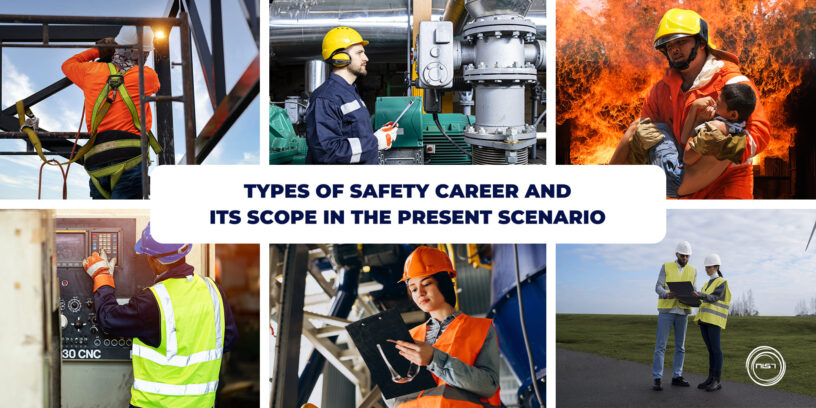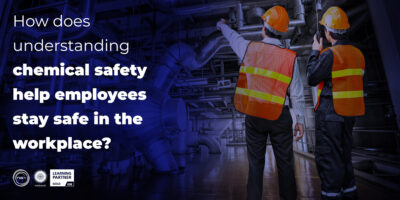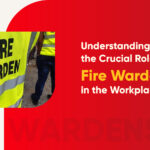Before delving into the various types of safety careers, we will explore the specifics of safety as well as the responsibilities of safety personnel.
Safety is basically about our life and health. Thereby, a safety career can be regarded as a career with the purpose of saving lives and preserving the health of people and also a career with the purpose of protecting the assets of an organization.
Responsibilities of a Safety professional:
In a workplace, accidents happen and they can be fatal. However, safety personnel is working hard to make their workers as safe as possible. Safety professionals spend hours educating employers on how to create a safe working environment for all their employees. Remember, ensuring workers’ safety and well-being will enhance the firm’s productivity.
The Safety career is about keeping people, goods, and equipment safe from harm or damage. Safety professionals create a safer working environment for everyone by helping with day-to-day job duties. A safety professional is an expert in making sure that risks are identified and safety precautions are taken to minimize hazards that may cause harm, injury or death. A safety career includes various levels or roles in which the safety professional is involved.
Safety professionals spend much of their time ensuring that everyone works in a safe environment. A safety professional is also responsible for the safety of the machines and equipment that are used in the workplace. This means that they should help maintain the working condition of these machines and that they are able to protect against any damages that could be caused by the work. They inspect machinery and equipment to ensure they’re safe and effective.
A safety professional should learn a great deal about the different dangerous or potentially dangerous products and equipment in the workplace. This could mean that they should learn a great deal about what dangers are present in electrical appliances and even how to test and repair them. They should also be aware of the dangers that are present in the workplace, including how to use machines or how to handle dangerous chemicals.
What are the types of Safety jobs?
This has been one of the highest-paying jobs, making it an excellent choice for learners. There are various jobs available in different areas of safety, each with its own set of titles, and, some of them are:
- Safety Inspectors
- HSE Assistant
- Health and Safety officers
- Environmental officer
- HSE Advisor
- HSE Specialist/Consultant
- Fire Safety Officer
- Safety Manager
There are just so many of them and there are different types of jobs for them as well. When considering what type of job to pursue, it is important to remember that each one has specific safety requirements that must be met.
1. Safety Inspector:
Safety inspectors are responsible for inspecting workplaces for their compliance to government regulations and the requirements of safety. They are also responsible for conducting safety audits, analyzing the results, and providing remedial recommendations. They need to be experienced in evaluating work instructions, examining documents and equipment, and observing production methods. They are also responsible for keeping the workplace compliant with OSHA laws. The role could involve looking at things such as: construction, buildings, machines, tools etc. You’re going to be required to make sure they are safe for the people who will be using them. They have to be able to analyze safety hazards, identify and report them, and help companies prevent such accidents in the future. The job duties of safety inspectors are usually to check for safety violations and provide solutions to problems. Safety inspectors need to have strong verbal and written communication skills.
2. Safety and Occupational Health Assistant
These safety and occupational health assistants are responsible for assisting employees with proper handling and use of chemicals, equipment, and tools, or to determine if work or procedure is safe. They are also responsible for ensuring that workplaces comply with OSHA standards.
They have to be experienced with the physical and chemical properties of various materials and equipment used in the workplace. Safety and occupational health assistants need to be able to write records and documents related to accidents.
The job duties of safety and occupational health assistants vary from company to company and job to job.
3. Health and Safety Inspectors:
If you are someone who likes to stay on top of safety, working as a health and safety inspector can be a good career option. This job is very important as the job description involves the safety of workers and the general public.
You need to learn to inspect areas for hazards and to be observant of working conditions. You can perform routine inspections of workplaces to identify and prevent any safety risks.
You will need to read and interpret data obtained from various sources. Health and safety inspectors have to be well-informed about safety issues and their legal and regulatory responsibilities in order to identify and correct potential hazards.
4. Safety Engineers:
If you have an interest in engineering and the field of mechanical engineering, this could be the perfect job for you. Safety engineers evaluate project blueprints and educate employees on best practices for using equipment and machinery. Safety engineers ensure that the work environment is safe for everyone.
5. Safety management and compliance officer:
This job is best for people who love working in a team environment. This position requires some form of safety training but does not always need you to have a degree.
6. Construction manager:
This could be a really popular job for learners looking for something within the construction industry. There are many job sectors that can be taken up as a construction manager, including design and development, project management, surveying, and construction.
7. Industrial hygienist:
An industrial hygienist inspects or analyses the effects of physical and chemical hazards in the workplace and recommends appropriate safety measures.
8. Fire Safety officer:
As a safety professional, your job sometimes involves firefighting or rescuing people. He advises and supports a firm in all aspects of fire protection and identifies fire risks; recommends measures for ideal and legally protected fire protection in a business. However, the job can be dangerous and stressful and you should be prepared for that.
9. Safety officer:
This could be an excellent career path for someone looking to advance into management. This job is ideal if you enjoy working with others and assisting them in remaining protective.
10. Safety specialist/supervisor:
A lot of companies like to hire people with safety skills who can also be really good at training and working with people. There are lots of companies out there who are hiring for this role so it’s important that you search around for the job you want and put yourself forward.
As a safety specialist, you’re not going to work as a typical employee. As part of a safety team, you’ll be required to go above and beyond to make sure the safety measures are taken in everything you do and everything you say.
The job could include working on building, construction, engineering, design, and even on medical equipment. There are some really high-paying careers, so you need to make sure you put yourself forward for what you want to do.
11. Hazardous material specialist:
If you have a degree, you may be able to get a job as a hazardous material specialist. In the role of a hazardous materials specialist, you will be in charge of ensuring all the safety measures are put in place. This means you are going to be responsible for ensuring the chemicals used are safe. The key to this job is that you must be an expert in your field. So you must understand all the chemical properties, risks, and different dangers. As a hazardous material specialist, you are expected to do a lot of different jobs.
Why NIST:
Our safety trainers make a significant contribution to learners’ professional development. Our internationally recognized courses will prepare you to work as the best safety specialist anywhere on the globe. We provide the best training for learners so that they can carry out their safety tasks and obligations effectively. We offer engaging, high-quality virtual sessions and webinars to help students study more effectively. Have a fantastic learning experience with NIST!
For further details regarding the course, you can contact our course counselors @ +91 8056000530 or mail us at info@nistinstitute.com.














Leave a Reply